- Home
- Tim Powers
Expiration Date Page 4
Expiration Date Read online
Page 4
He recoiled away from a memory of duct tape.
If he just got rid of the glass brick, would all this stuff stop happening? But who would eventually find it, and why had his parents kept it hidden?
He remembered a Robert Louis Stevenson story about a devil in a bottle—it could get you anything you wanted, but if you died owning it you’d go to hell—and if you wanted to get rid of it you had to sell it for less than you’d paid for it, or it would come back to you even if you threw it into the ocean.
Was this thing worth money, could he sell it? Was it a “cigar”? If so, he could have got a hundred dollars for it from the Jaguar woman last night. It seemed to him that a hundred dollars was a good deal less than what he had paid for it.
There was a low, white-painted cinder-block wall around the little parking lot of a strip shopping center ahead of him, and he crossed to it and hiked himself up to sit on the coping. He glanced around at the wide, busy intersection and the sidewalks to make sure no one was paying any particular attention to him, and then he unbuttoned the pocket of his heavy flannel shirt and lifted out the glass brick. It seemed to click, very faintly deep inside, when he turned it in his hand.
This was the first time he’d looked at it in sunlight. It was rectangular, but bumpy and wavy on its surfaces, and even when he held it up to the sun he couldn’t see anything in its cloudy depths. He ran a finger around its narrow side—and felt a seam. He peered at the side surfaces and saw that a tiny straight crack went all the way around, dividing the brick into two equal halves.
The two guys that had robbed him so long ago last night had taken his Swiss army knife, so he worked a fingernail into the groove and twisted, and only managed to tear off a strip of his nail. By holding the glass thing between his palms, though, with his fingers gripped tightly over the edges, he was able to pry hard enough to feel the two glass sections move against each other, and to be sure that the thing could be opened.
He pressed it firmly together again and took off his backpack to tuck the brick safely down among his tumbled clothes. He pulled the flap down over it all and then, since the plastic buckles had been broken last night, carefully tied the straps tight before putting the backpack on again. Maybe people wouldn’t be able to sense the glass thing so easily now.
Like a gun, he thought dully, or a grenade or blasting caps or something. It’s like they had a gun in the house and never told their kid even what a gun is. It’s their own fault I somehow accidentally got them killed by playing with it.
If I open it—what? A devil might come out. A devil might actually come out. It wouldn’t matter whether or not I believe in devils, or that my friends and the teachers in school don’t. People in 1900 didn’t think that radium could hurt you, just carrying a chip of it in your pocket like a lucky rock, and then one day their legs fell off and they died of cancer. Not believing something is no help if you turn out to be wrong.
He heard the short byoop of a motorcycle cop’s siren and looked up nervously—but the cop was stopping way out in the intersection, and, as Kootie watched, he climbed off the blue-flashing bike and put down the kickstand and began directing traffic with broad slow gestures. The traffic signals had gone completely out sometime during the last few minutes, weren’t even flashing red; and then even when the policeman waved for the southbound lanes to move forward, the cars and trucks and buses stayed backed up for another several minutes because nearly every driver had stalled and had to start up again.
As Kootie crossed Beverly, the sound of grinding starter motors was echoing among the lanes behind him like power saws.
CHAPTER 5
“Then you keep moving around, I suppose?” said Alice.
“Exactly so,” said the Hatter, “as the things get used up.”
“But what happens when you come to the beginning again?” Alice ventured to ask.
“Suppose we change the subject,” the March Hare interrupted …
—Lewis Carroll,
Alice’s Adventures in Wonderland
ONE OF THEM HAD finally been for real.
It had been two hours since the Greyhound bus had pulled out of the dawn-streaked yard of the Albuquerque station, subsequently finding the I-40 highway and cranking its way up through the dry rock Zuni Mountains, downshifting to follow the twisting highway among the ancient lava beds, and booming down the western slope to roar right through Gallup without stopping; but when the bus finally swung off the I-40 at the little town of Houck, just over the border into Arizona, Angelica Anthem Elizalde simply kept her seat while most of the other passengers shuffled past her down the aisle to catch some fresh morning air and maybe a quick cup of coffee during the fifteen-minute stop.
She looked out her window. Though it was now eight-thirty, the bus was still casting a yards-long shadow, and the shadow pointed west. She shivered, but tucked her ladies’ magazine into the pocket of the seat in front of her.
She had hoped to distract herself with its colorful pages, but had run aground on an almost hysterically cheerful article about how to cook squash, with a sidebar that addressed “Twelve Important Squash Questions”; and then she had been forced out of the pages again by a multiple-choice “Creativity Test,” which gave high marks to the hypothetical housewife who, confronted with two mismatched socks after all the laundry had been put away, elected to (C) make hand puppets of them rather than (A) throw them away or (B) use them for dusting.
None of the listed answers had been anything like “burn them,” “eat them,” “bury them in the backyard,” or “save them in case one night you answer the door to a stranger with bare, mismatched feet.”
Elizalde managed a tight smile. She flexed her hands and wondered what work she would find to do in Los Angeles. Typist, again? Waitress, again? Panhandler, bag lady, prostitute, a patient in one of the county mental hospitals in which she’d done her residency—
—a felon locked up in the Sybil Brand Institute for Women—
She quickly fetched up the magazine out of the seat pocket and stared hard at a photograph of some happy family having fun around a swing set (—probably all of them models, really, who had never seen each other before lining up there for the picture—) and she thought again about turning back. Get off the bus at Flagstaff, she told herself, and catch the 474 bus, take it all the way back to Oklahoma City, be there by eight-thirty tonight. Go back to the big truck stop under the Petro water tower, tell the manager at the Iron Skillet that you were too sick to call in sick when you failed to show up for the waitress shift last night.
Get back on that old heartland merry-go-round.
For nearly two years she had been traveling, far from Los Angeles, working in restaurants and bars and small offices, along the Erie Canal from the Appalachians to Buffalo, and up and down the Ohio River from Pittsburgh to Cairo, and, most recently, along the Canadian River in Oklahoma. She’d celebrated her thirty-fourth birthday with half a dozen of the Iron Skillet waitresses in the bar at O’Connell’s in Norman, twenty minutes south of Oklahoma City.
At least L.A. would be fairly warm, even now, in October, four days before Halloween. The Mexican street vendors in the Boyle Heights area might already be selling El Día de los Muertos candy, the white stylized skulls and skeletons—
(—Shut up!—)
Again she forced herself to stare at the family in the magazine photo, and she tried to believe that it really was a family, that they were genuinely enjoying some—
(—long-lost—)
(—Shut up!—)
weekend in the backyard, oblivious of this photographer—
… It didn’t work. The adults and kids in the photograph just looked like models, strangers to each other.
Elizalde remembered driving the L.A. freeways at night, snatching an occasional glance to the side at some yellow-lit kitchen window in a passing apartment building, and always for one moment desperately envying the lives of whatever people lived there. She had always imagined hammered-copper rooste
rs on the kitchen wall, a TV in the next room with “Cheers” getting innocent laughs, children sitting cross-legged on the carpet—
(—Shut up.)
That had never really worked, either. Maybe those apartments had all been vacant, with the lights left on. She folded the magazine and put it back.
A few moments later she jumped, and looked toward the front of the bus just before the first returning passenger stepped aboard, rocking the bus on the shocks. Elizalde sighed. No, she couldn’t go back to Oklahoma.
For about twelve hours now she had been doing this, reacting to noises and jolts just before they happened. She’d been in bed when it started, and she’d awakened in her darkened apartment just before the clock radio had blared on. At first she had thought some mental clock had been keeping track of the time while she’d slept—she’d found herself remembering her grandmother’s saying, Es como los brujos, duerme con los ojos abiertos: He is like the witches, and sleeps with his eyes open—but the effect had continued as she’d proceeded to get ready for work, so that she’d flinched before water had come out of the shower head, and dropped her hair dryer because it had seemed to quiver animatedly in her hand just as she was about to push the On button.
Then she had begun blinking her eyes even before the tears welled up in them. She’d sat down on her bathroom floor and just sobbed with fright, for in the same way that she’d seemed to be anticipating physical events, she had now been afraid that an idea was about to surface in her mind, an idea that she had been strenuously avoiding for two years. Before she’d been able to distract herself, the idea had hit her: maybe she had not, after all, had a psychotic schizophrenic episode in her Los Angeles clinic in 1990.
And, bleakly, she had known that she would have to go back there and find out. Find out if
One of them had finally been for real.
Everybody was getting back on the bus now, and the driver had the engine idling. Elizalde let her head sink back against the high, padded seat, and she thought she might at last be able to get some sleep, during the twelve hours it would take the bus to plow on through Flagstaff and Kingman and Barstow to, finally, Los Angeles.
After all, it seemed that nothing could sneak up on her.
Soy como las brujas, duermo con mis ojos abiertos.
Pete Sullivan clanked the gearshift into neutral and gunned the engine to keep it from stalling. He was stopped in what was supposed to be the fast lane of the 101, a mile or so short of the tunnel where the northbound Santa Ana Freeway would merge in. God only knew when he would get to Hollywood.
Though it was a non-holiday Friday morning, even on the westbound 60 the traffic had been jammed up—fully stopped much of the time, and occasionally speeding up and opening out in front of him for just enough moments to let him imagine that the congestion was behind him, before the red brake lights would all start glaring again ahead of him.
In the driver’s seat of his van he was above most of the other drivers, and during the course of an hour, while his foot had moved back and forth from the brake to the gas pedal, he had watched the towers of Los Angeles rise ahead of him in the brassy light. The towers had been scrimmed to dim silhouettes by the smog, as if they were faded shapes in a photograph that’s been left out too long in the sun—or, he had thought, as if the city has had its picture taken so many times that the cumulative loss of images had begun to visibly diminish it.
Like deLarava’s ghosts, he had thought. Maybe the whole city has died, but is too distracted to have realized it yet.
The towers were clearer now, and it was disorienting to see big buildings that he didn’t recognize—one of the new ones was a tall tan-stone cylinder, like a stylized sculpture of a rocket ship, and he wondered uneasily if he would still be able to find his way around the city’s streets.
His window was open to the diesel-reeking air, and he looked down over his elbow at the center divider, which in the old days had generally just been a featureless blur rushing past. Flowering weeds, and even a couple of midget palm trees, were pushing up out of cracks in the concrete, and curled around them and the many Budweiser cans was an apparently constant web of brown tape from broken stereo cassettes; there were even a lot of peaches for some reason, bruised but unbitten, as if some citizen of this no-man’s-land had left them there like Hansel and Gretel’s bread crumbs.
Sullivan wondered what cassettes these were that drivers had so prodigally pitched out their windows, and he grinned nervously at the temptation to open the door and salvage some of the tape. It would be a cinch to clean it and wind it onto a fresh cassette-half. Would it all be the same kind of music, perhaps even all copies of the same tape? It occurred to him that the center divider looked like a miles-long shrine to primitive-but-urban gods; and he shivered and turned his attention back to the pickup truck in front of him, in the bed of which two Mexican girls were listlessly brushing their long black hair.
About an hour ago he had stopped peering ahead to see what wreck or freeway construction would be causing the traffic jam—apparently the freeways just snarled up without any definable cause these days, like the turbulence that would sometimes inexplicably shake a sump pipe at a power station even when all the air had been bled out of it.
In Los Angeles space is time, he thought—you don’t say I’m thirty miles from downtown, you say I’m half an hour from it. If unpredictable turbulence has become a real, constant factor in traffic, then all the maps and clocks are broken (like the Mad Hatter’s butter-clogged watch!) and you can only make a hazy guess about how far it might be from one point to another.
I’m a hundred years from Venice Beach, he thought, and a thousand miles from Christmas Eve of 1986. Better draw up a chart.
He pushed the thought away and concentrated on the traffic.
The Brew 102 brewery proved to be gone. 102 had been the only beer Sullivan had ever encountered that had sediment in it, but he found that he missed the old black-and-yellow sign, and he was further disoriented to see half a dozen helicopters parked on the wide roof of a building on the other side of the freeway. With the glittering rocket still ahead of him, the whole place was looking like a poster for some 1930s science-fiction movie.
When he eventually gunned the van up the off-ramp at Hollywood Boulevard, though, there were beat-up old couches under the palm trees in the freeway border area, and a dispirited-looking group of ragged black men, their hair in ropy dreadlocks, were slouching there in the shade. He half expected to see chickens running around their skinny ankles, and a fire in a split oil drum behind them.
The clocks and maps are smashed and ripped to bits, he thought. Even though it was the best butter.
He drove west on Hollywood Boulevard, cautiously pleased to see that though the names of many businesses had changed—there was no Howard Johnson’s restaurant at Hollywood and Vine anymore—most of the actual buildings he remembered had survived.
It seemed to him that it had always been like this, in the area from Franklin south to Melrose and beyond. Every building looked as if it had originally been used for something else. Even here on Hollywood Boulevard, the odd top corners of the storefronts were frequently broken or bent, showing old brick underneath, and between buildings he could see brick alcoves, way up and far back, dating from God knew when. Tiny ironwork balconies still stuck out on second and third floors, with probably nothing behind them anymore but empty offices.
Now that he was nearly there—only one turn remaining, a right onto Laurel Canyon once he’d got out past this tourist area of the boulevard—he was in no hurry to get to the ruins he and his sister had explored on that spring day in ’86. At Wilcox he impulsively decided to turn north—and when he’d made the turn he saw that the Shelton Apartments had been torn down, replaced by some sprawling new pink apartment building.
He pulled the van over to the curb and switched off the engine for the first time since stopping for eggs and bacon in Blythe, four hours ago. Then for several minutes, while he lit a ciga
rette and stared across the street at the new four-story building, he tried to remember the old Shelton.
Like the Lido and the Mayfair, both of which were still standing a block farther up the street, the Shelton had had one of those big signs on the roof, separate ornate letters in line, supported by a lattice of steel beams, and had had a lot of the decorative cornices and balconies that architects never seemed to bother with anymore. The only eccentricities of this new place, the HOLLYWOOD STUDIO CLUB APARTMENTS, were inset windows and an apparent blanket policy of having all corners be rounded. A banner across the top announced $777 MOVES YOU IN! Probably not a bad price around here, he thought absently, these days. It had been while filming a documentary in the lobby of the old Shelton in the winter of ’84 that he and his sister had finally got a strong clue about what Loretta deLarava really did.
deLarava had hired the twins right out of college ten years earlier, and they’d been working for her ever since as “gaffers”—lighting technicians. deLarava produced short-subject films—in-house instruction pieces for businesses, nontimely human-interest bits for news programs, the occasional commercial—and for twelve years the twins had spent their days driving to what seemed like every corner of Los Angeles, to lay cables and set up Genie lifts and hang lights over some beach or office floor or sidewalk.
deLarava had been a disconcerting boss. One of the first jobs the twins worked on with her had been a short film about the vandalizing of Houdini’s grave in Brooklyn in 1975—and deLarava had been the first to cover the event because it hadn’t even occurred before she arrived. It had been deLarava herself who shattered the stone bust of Houdini in the Machpelah Cemetery and took a mummified thumb out of a hollow inside it, and who had dug two plaster hands out of the soil in front of the grave. The twins had of course not even been tempted to turn their new boss in to the authorities—but, apparently on a drunken whim, Sukie had stolen the thumb and the hands from deLarava’s luggage on the drive back to the airport.

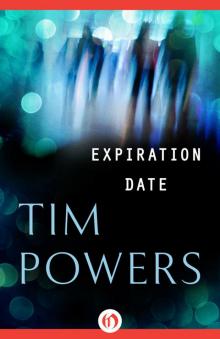 Expiration Date
Expiration Date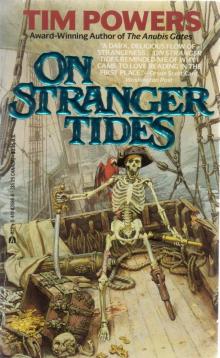 On Stranger Tides
On Stranger Tides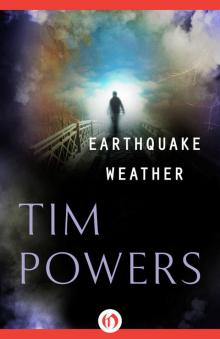 Earthquake Weather
Earthquake Weather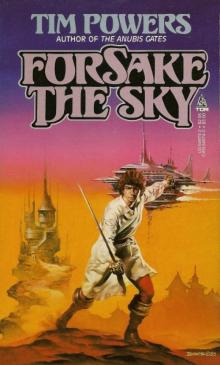 Forsake the Sky
Forsake the Sky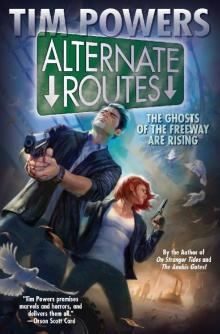 Alternate Routes
Alternate Routes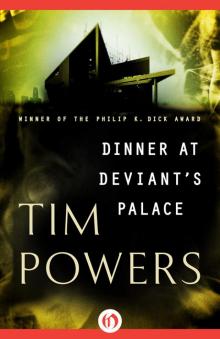 Dinner at Deviant's Palace
Dinner at Deviant's Palace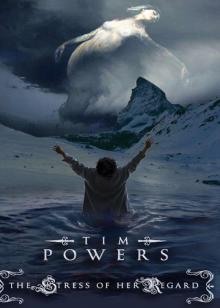 The Stress of Her Regard
The Stress of Her Regard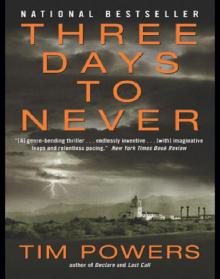 Three Days to Never: A Novel
Three Days to Never: A Novel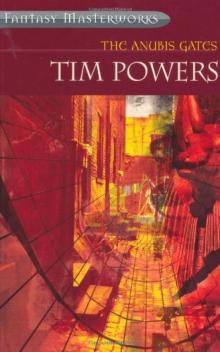 The Anubis Gates
The Anubis Gates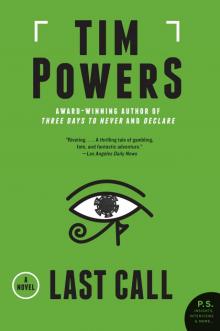 Last Call
Last Call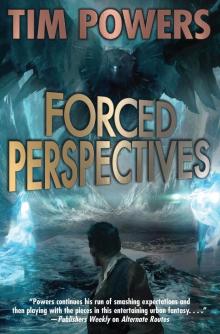 Forced Perspectives
Forced Perspectives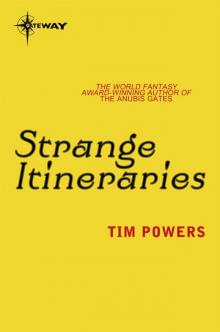 Strange Itineraries
Strange Itineraries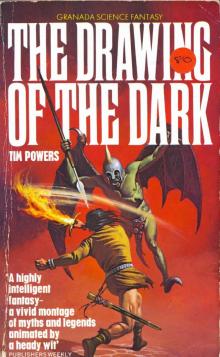 The Drawing of the Dark
The Drawing of the Dark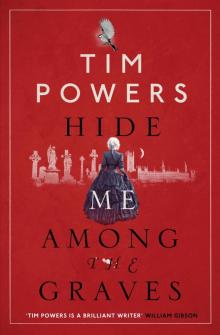 Hide Me Among the Graves
Hide Me Among the Graves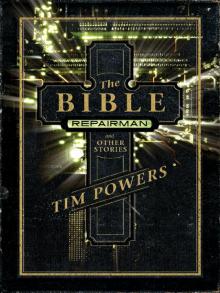 The Bible Repairman and Other Stories
The Bible Repairman and Other Stories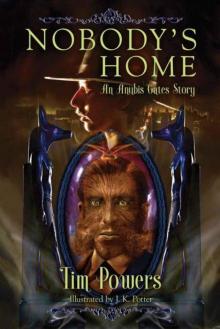 Nobody's Home: An Anubis Gates Story
Nobody's Home: An Anubis Gates Story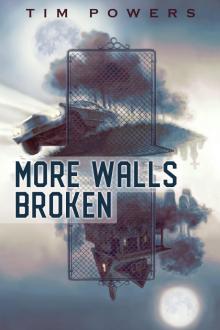 More Walls Broken
More Walls Broken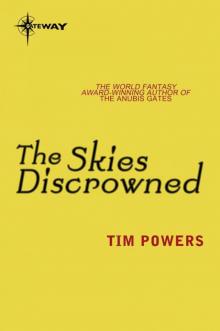 The Skies Discrowned
The Skies Discrowned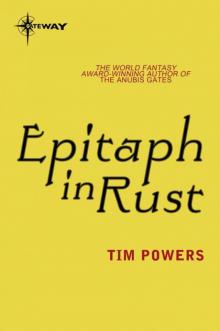 Epitaph in Rust
Epitaph in Rust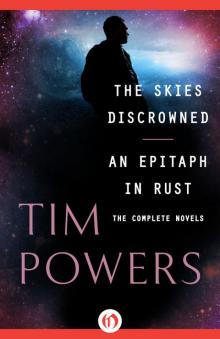 Skies Discrowned and An Epitaph in Rust
Skies Discrowned and An Epitaph in Rust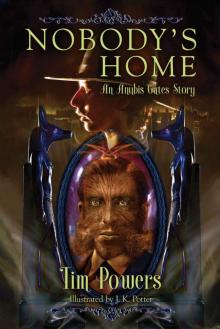 Nobody's Home
Nobody's Home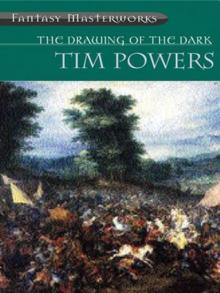 Drawing of the Dark
Drawing of the Dark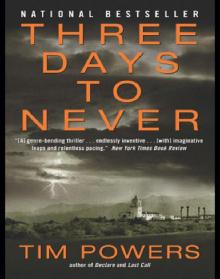 Three Days to Never
Three Days to Never